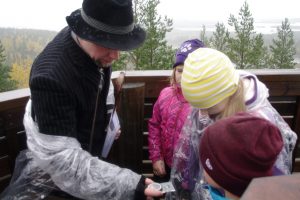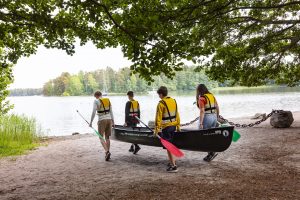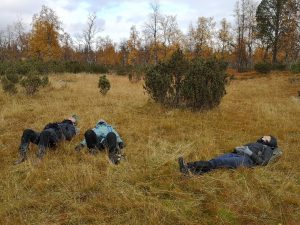Career Paths of Adventure Educators Graduating From Humak Now and in the Future

For more than 20 years, Humak has been offering adventure education as part of our Finnish Community Educator degree programme, as vocational continuing education and as open UAS courses. In the autumn of 2018, a new English Bachelor in Adventure and Outdoor Education (Community Educator) degree that focuses on adventure education was launched, from which a dozen students have graduated so far.
In the autumn of 2021, we collected information on the employment of community educators who have studied adventure education at Humak. This included the impact of adventure education studies on their careers, and the future job prospects of community educators in the field of adventure education. The respondents of the panels and survey consisted of both people working in expert and management positions in the field of adventure education and professionals who had graduated from Humak’s adventure education studies.
In this article, I first look at the placement of adventure educators in working life based on data collected from Humak adventure alumni. Finally, I will discuss future job prospects and new opportunities in the industry based on data from both groups of respondents.
Most Adventure Educators End up in Youth and Social Work or as Educators
The panel that focused on career paths was attended by 11 adventure education professionals who have studied at Humak. The age range of the respondents was 30-49 years and each of them had completed their adventure education studies between 2011-2021. Four of the respondents had studied adventure education at Humak open UAS courses and five had studied adventure education as part of their Finnish Community Educator degree. One respondent had completed the new international Adventure and Outdoor Education degree. All respondents were employed at the time. 90% of the respondents said that they were quite or very satisfied with how beneficial the adventure education studies had been for their career.
Most of the panel participants (6) worked as youth or social workers at the time. One had employed themselves as an adventure instructor and educator. The participants’ main employers were most typically municipalities and joint municipal authorities (including hospital districts), companies, organizations, foundations, parishes etc.
In addition to their current job title, the respondents were asked what outdoor adventure education-related positions they had worked in throughout their careers. Many of the respondents had worked as educators, as safari, nature or wilderness guides, and as youth or adventure instructors in environments that utilize nature and the outdoors. A few had also utilized elements from adventure education in their child protection and psychiatry related job positions. The current job titles reported by the respondents in our survey describe this range of tasks well:
youth worker
adventure instructor/educator (self-employed)
youth counselor
instructor in child welfare institution
vocational teacher
outreach youth worker/instructor
family work counselor
leisure secretary
social field work instructor
head of rental and ticket services

Progressing to New, More Interesting and Demanding Work Tasks Is Easier Due to Adventure Education Studies
Most of those who had studied adventure education at open UAS had worked in instructor positions in the youth work, social work and sports fields or as educators even before their adventure education studies. Their answers emphasized, for instance, how adventure education studies have helped them to progress to new, more interesting and demanding work tasks or enabled the utilization of adventure education skills as part of their own work. Respondents also highlighted how adventure education studies have strengthened their self-knowledge and professional self-confidence, which has served as an incentive to apply for new types of work positions.
”I can see that from the beginning that AdEd studies have allowed me to have a slightly different job description in my field, which is why I haven’t tried to move on to new tasks. To some extent, I feel that my studies have been useful in that from the beginning, and I feel that in my profession, adventure education is a different methodological skill that strengthens my position in the labor market.”
Adventure Education Studies Provide a Huge Variety of Career Opportunities
According to the survey, the respondents had had a huge variety of different jobs related to adventure education. Jobs that were mentioned several times included instructing or counseling in national youth centers and in the field of child protection, as well as educating and teaching in the field of education or sports.

It is also worth noting that during the course of their careers, many of the respondents have provided adventure education services to various target groups on the side or through their own company. Examples of this include working as an outdoor adventure instructor, a trainer for sports federations, or organizing days of workplace wellbeing for companies. The careers of community educators specializing in adventure education have also included various development and expert positions. These include leisure secretary, product developer and project designer.
Adventure Educators Also Have Good Skills for Working in the Field of Nature and Adventure-Based Services
The survey also shows that many of those who have graduated from vocational school with a wilderness and nature guide degree have wanted to supplement their skills by studying adventure education in open UAS or by applying to the bachelor’s degree programme:
“My previous profession was a wilderness and nature guide. Therefore adventure education has not really helped me to change my career, but to take my previous skills further. In my opinion, adventure education-focused community educator studies offer the closest bachelor’s degree that builds a clear career path for a wilderness guide whose emphasis and competence has been in adventure sports. My basic work tasks have not changed significantly after my adventure education studies, but new, more diverse work tasks have emerged alongside them, including various training services.”
This contributes to the fact that although the majority of community educators specializing in adventure education work as educators as well as in instructor and expert positions in youth work and social work after graduation, the degree also provides good skills for working in the field of nature- and adventure-based services. The results of the Delphi panel – which also mapped out the skills required in the future and new job opportunities in adventure education, which will be covered in the next section – also indicate this.
Adventure Educator’s Field of Work Will Expand in the Future, but Core Competencies Will Remain the Same
The skills needed in the future of community educators specializing in adventure education were examined by two separate panels. Both panels included participants that worked in management positions or as developers in the field of adventure education, as well as participants that worked in basic instructor positions in the industry. A total of 21 people participated in the panels.
The study clearly expressed the view that community educators specializing in adventure education are expected to have an increasing foothold in the commercial market in the future, where adventure education is applied to the provision of nature- and adventure-based services. The panelists believed that this is due to the ability of adventure education experts to master the processes and elements related to adventure education in a way that creates depth and new nuances to customers’ experiences. This, in turn, adds significant value to the services.
Potential Future Job Titles for Adventure Educators
In addition to commercial services, the panelists saw future adventure educators expanding their field of work to new jobs in the cultural and social sectors. This could include, for instance, rehabilitation work and collaboration with occupational health care and well-being professionals. The panelists also believed that there would be demand for the provision of freelancer and entrepreneur based adventure education expertise in various environments. The panel also mentioned new job titles such as “grounder“, “connector” and “community builder and conflict resolutioner.”

The extension of the work field to the commercial side also strongly divided opinions and was not considered a particularly desirable development by many of the respondents. However, there was a strong consensus among all the participants in the panel that the core competencies and job responsibilities of adventure educators will continue to be linked to supporting of growth, development and experiential learning with different groups of children and young people.
However, this does not mean that the field of work will remain unchanged, but that there are many opportunities for expanding the use of skills and knowledge of outdoor adventure educators to new areas and new tasks in the field of education. The panelists also believed in the growth of development projects focused on adventure education, both internationally and domestically. However, it was also stated that such a development requires extensive high-quality training of outdoor adventure educators.
International Degrees Take Adventure Education Expertise Abroad
At the time this survey was conducted, less than 10 students had graduated from our international English degree and only one of the respondents was an alumni from the programme. Starting this year, about 20 community educators specializing in adventure education will graduate from the international degree programme each year. They will certainly change and develop the field of work for adventure educators in completely unpredictable and new directions.
In the future, it is worth gathering more information about the career paths and employment of students who have completed our international degree. Then we will most likely find out that the work field of adventure educators who have graduated from Humak has expanded beyond Finland. On the other hand, it will also be possible to estimate, for example, how many of the students who come to Finland to study adventure education from abroad will find employment here in Finland after graduation.
Text: Tero Lämsä, Master of Education, Lecturer and Head of Degree Programme, Adventure and Outdoor Education
Translation: Mari Ervasti
